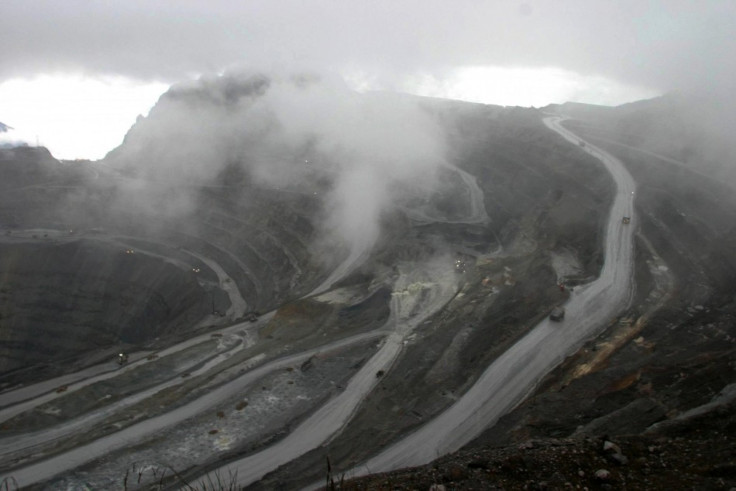Indonesia's New Mining Law Not Aimed at Freeport: Report

(REUTERS) -- A new Indonesian regulation that changes the rules on foreign ownership of mines applies to all foreign companies and is not aimed specifically at the largest of those, Freeport McMoRan Copper & Gold Inc (FCX.N), the deputy energy and mining minister said on Thursday.
Indonesia has substantial mineral wealth and is the world's top exporter of thermal coal and tin, but attention has focused on Freeport since news on Wednesday of the regulation which could deter fresh investment in the sector.
Freeport is negotiating to renew its royalty contract to run the Grasberg mining complex, which has the world's largest gold reserves and is the second-largest copper mine.
The regulation could be an attempt by the government to increase pressure on Freeport, some analysts said. One source with knowledge of the industry said local mining companies stood to gain.
A forced divestment of Freeport to only Indonesian entities with the deflated prices that will bring will undoubtedly create a huge short-term windfall for several Indonesian corporates, the source said.
I can't see how Freeport is going to invest the $15 billion needed to go underground in Grasberg if they will lose control of the mine, said the source with reference to a plan by Freeport to operate underground in 2016.
Freeport began operating in Indonesia in 1967 and won its contract at Grasberg in the highlands of Papua in 1991. It currently owns about 90 percent of the open-pit mine, which has 33.7 million ounces of gold reserves and 32.7 billion pounds of copper. The remainder belongs to the government.
Under the rules signed by President Susilo Bambang Yudhoyono on February 21, Southeast Asia's largest economy will require foreign companies to sell down stakes in mines and increase domestic ownership to at least 51 percent by the 10th year of production.
The regulation will be imposed on every mining company operating in Indonesia, in general. That includes Freeport and Newmont, said Deputy Minister Widjajono Partowidagdo, adding it was wrong to assume the law was aimed specifically at Freeport.
Newmont Mining Corp (NEM.N) is also engaged in a renegotiation with the government. Foreign direct investment in the sector topped $2.2 billion in 2010.
This regulation is not only for Freeport. It is for all foreign mining companies in Indonesia, to guarantee greater benefit to the country from the mining sector, the minister told Reuters in a telephone interview.
Thamrin Sihite, director general of coal and mining in the ministry of energy and minerals, said the new regulation was already part of the talks with Freeport.
NEGATIVE CONSEQUENCES
Indonesia won investment grade status recently due to its relatively stable fiscal environment, low level of debt, annual growth running at more than 6 percent and a big domestic market in the fourth-largest country in the world.
The new status could boost calls already growing in the country for a more assertive attitude towards partnership with foreign companies, particularly in the resources sector where last year there were several cases of violent clashes over land rights.
Freeport alone contributes 1.6 percent of Indonesia's gross domestic product and, according to the statistics bureau, the mining sector as a whole made up 11.9 percent of the economy in 2011.
Many in Indonesian politics and the public see that Freeport and some other cases are not fair to Indonesia. The principle is that we need to implement that law. But how much and how fast - that is still under the ministry of mining and energy, Deputy Trade Minister Bayu Krisnamurthi said.
We still believe, even with only 49 percent, it (the mining sector) is still very alluring, still very lucrative for everybody. In some countries, this industry is prohibited from international investors.
Some analysts and mining industry sources said inconsistent policy-making could threaten growth in the sector, which was shaken by a rule last month that companies must stop exporting some unprocessed raw metals in 2014. Coal was exempted.
Fitch believes Indonesia will take a pragmatic approach to industry regulations as failing to do so can have negative consequences for the sector in the long-run, the ratings agency said in a special report on Thursday.
Indonesia's coal mining sector should continue to see strong growth prospects but can benefit from clearer and more predictable regulations, it said.
UNREST
The Grasberg mine has become a high-profile example of growing labor unrest in Indonesia as workers push for more of the spoils in a booming economy. Freeport partially met worker demands for a pay rise in December after a three-month strike.
Since then, upheaval at the mine in Papua has continued and Freeport Indonesia said late on Wednesday it would resume operations there on Monday after a suspension caused by work disruptions.
On Thursday, the union disputed that, saying it, rather than management, had decided to resume work and Freeport was refusing to pay workers who were slow to return after the strike.
We want to give the management a month starting Monday to sort the wage problem with the workers. We will see on April 12 if this problem can be sorted out, union spokesman Virgo Solossa told Reuters by telephone.
© Copyright Thomson Reuters 2024. All rights reserved.






















